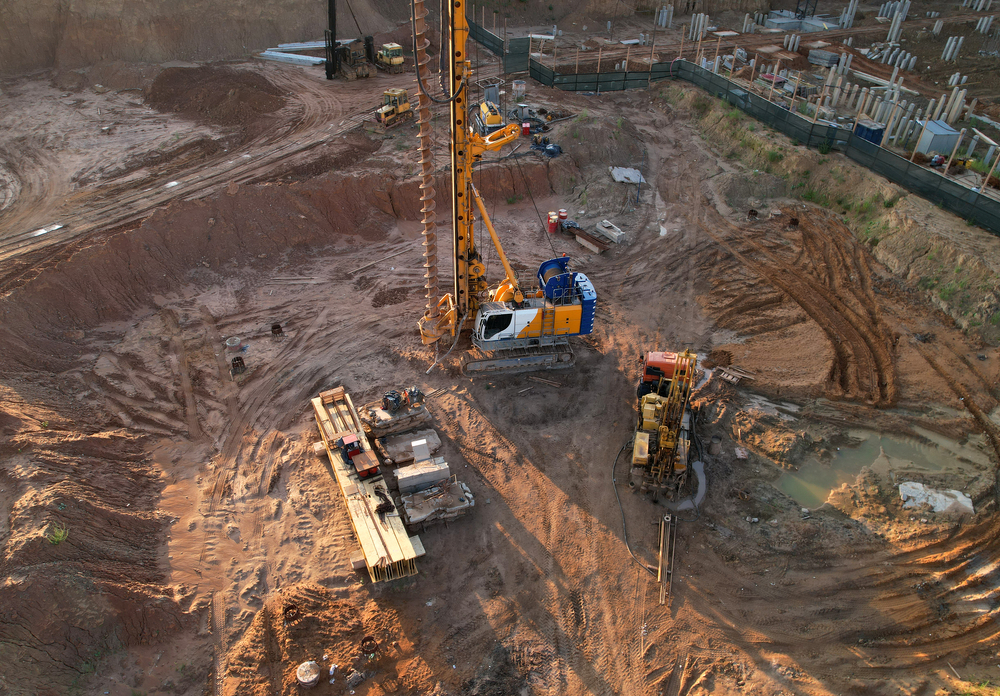The 6-Second Trick For Geotheta
The 6-Second Trick For Geotheta
Blog Article
The Geotheta PDFs
Table of Contents5 Simple Techniques For GeothetaGeotheta for DummiesUnknown Facts About GeothetaGeotheta Can Be Fun For EveryoneThe Main Principles Of Geotheta

They carry out website examinations, gather samples, carry out research laboratory examinations, and examine information to evaluate the viability of the ground for building projects - Geotechnical Engineers. Based upon their searchings for, geotechnical engineers provide recommendations for foundation design, slope stability, keeping frameworks, and mitigation of geotechnical hazards. They collaborate with other specialists, such as designers, architectural engineers, and construction teams, to ensure that geotechnical factors to consider are integrated into the overall task design and application
By examining the behavior and homes of dirt and rock, they can identify prospective geotechnical dangers such as landslides, soil settlement, or slope instability. Their know-how helps avoid failures or accidents that can threaten lives and building. Below are some comprehensive tasks and duties of a geotechnical engineer: Website Investigation: Geotechnical engineers conduct website investigations to collect information on subsurface conditions.
They analyze the data to understand the residential or commercial properties and actions of the soil and rock, including their stamina, leaks in the structure, compaction attributes, and groundwater problems. Geotechnical Analysis and Style: Geotechnical engineers analyze the data gathered throughout website investigations to evaluate the stability and viability of the website for building tasks. They execute geotechnical calculations and modeling to assess aspects such as birthing capability, settlement, slope security, side planet pressures, and groundwater flow.
The Best Guide To Geotheta
Structure Design: Geotechnical designers play a crucial role in designing foundations that can securely support the desired framework. They evaluate the soil problems and load needs to determine the proper structure type, such as shallow foundations (e.g., footings), deep structures (e.g (https://www.twitch.tv/geotheta/about)., heaps), or specialized strategies like soil improvement. They think about elements such as settlement limitations, birthing ability, and soil-structure communication to create ideal foundation designs
They review building strategies, monitor website activities, and perform field examinations to verify that the layout suggestions are complied with. If unforeseen geotechnical issues develop, they assess the circumstance and offer suggestions for remediation or adjustments to the layout. Threat Assessment and Mitigation: Geotechnical engineers assess geotechnical dangers and risks connected with the task site, such as landslides, liquefaction, or soil disintegration.

Collaboration and Communication: Geotechnical engineers function very closely with other experts associated with a project, such as architects, architectural engineers, and building teams. Effective interaction and partnership are important to incorporate geotechnical considerations right into the general task design and building procedure. Geotechnical engineers give technological know-how, response questions, and make certain that geotechnical needs are satisfied.
An Unbiased View of Geotheta
Right here are some kinds of geotechnical engineers: Structure Engineer: Foundation designers specialize in making and examining structures for structures. They assess the dirt conditions, tons requirements, and website features to identify the most suitable structure kind and layout, such as shallow structures, deep foundations, or specialized strategies like stack structures.
They evaluate the factors affecting incline security, such as soil homes, groundwater problems, and slope geometry, and create techniques to prevent incline failings and reduce risks. Quake Engineer: Earthquake engineers concentrate on examining and developing structures to hold up against seismic forces. They examine the seismic hazard of a website, review dirt liquefaction potential, and establish seismic layout standards to make sure the safety and security and strength of structures during earthquakes.
They perform field screening, collect samples, and examine the accumulated information to define the soil properties, geologic formations, and groundwater conditions at a site. Geotechnical Instrumentation Engineer: Geotechnical instrumentation designers concentrate on surveillance and gauging the habits of dirt, rock, and structures. They install and keep instrumentation systems that check variables such as soil negotiation, groundwater levels, slope motions, and architectural variations to examine efficiency and offer early cautions of potential issues.
How Geotheta can Save You Time, Stress, and Money.
They perform examinations such as triaxial tests, debt consolidation tests, straight shear tests, and permeability tests to collect data for geotechnical analysis and design. Geosynthetics Designer: Geosynthetics engineers specialize in the design and application of geosynthetic products, such as geotextiles, geogrids, and geomembranes. They utilize these materials to boost soil stability, strengthen slopes, give drain remedies, and control disintegration.
They have a tendency to be investigative individuals, which means they're intellectual, introspective, and investigative. They are curious, methodical, logical, logical, and logical. Some of them are additionally social, indicating they're kind, charitable, cooperative, patient, caring, practical, compassionate, tactful, and friendly - Consulting Engineer.
In the workplace environment, geotechnical engineers use specialized software devices to carry out computations, create styles, and examine information. They prepare records, review task specs, connect with clients and employee, and coordinate job activities. The workplace setting provides a helpful setting for research study, analysis, and cooperation with various other experts included in the job.
The 8-Second Trick For Geotheta
They often see project sites to perform site investigations, analyze geotechnical conditions, and collect information for analysis. These gos to see this page include taking a trip to different locations, in some cases in remote or tough surfaces. Geotechnical engineers might execute soil sampling, conduct examinations, and display building and construction tasks to guarantee that the geotechnical elements of the job are being implemented properly.
Geotechnical designers additionally function in specialized geotechnical laboratories. Geotechnical research laboratory designers work extensively in these environments, dealing with screening devices, operating instruments, and recording information.
Report this page